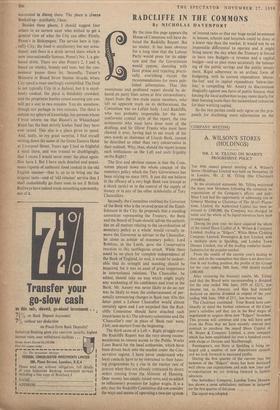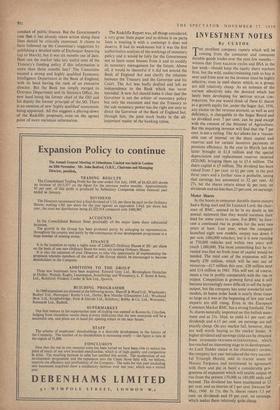RADCLIFFE IN THE COMMONS
By NICHOLAS DAVENPORT BY the time this page appears the House of Commons will have de- bated the Radcliffe Report. But no matter. It has been obvious for a long time that the Labour Party would press for its adop- tion and that the Government would oppose, damning with faint praise and rejecting practi- cally everything except the recommendations for more pub- lished information. That this
unanimous and profound report should be de-
bated on party lines seems at first extraordinary. Apart from the two trade union members, who left no apparent mark on its deliberations, the Committee was no Leftist body. Lord Radcliffe, who was probably responsible for the non- conformist cynical style of the report, the two economists who must have done most of the drafting, and Sir Oliver Franks who must have chewed it over, having had to eat much of his own words as chairman of Lloyds Bank, cannot be described as other than very conservative in their outlook. Why, then, should the report arouse such enthusiasm on the Left and such frigidity on the Right?
The first and obvious reason is that the Com- mittee played down the whole concept of the monetary policy which the Tory Government has
been relying on since 1951. It just did not believe in the efficacy of a very high Bank rate (except as
a shock tactic) or in the control of the supply of money or in any of the other shibboleths of Tory Chancellors.
Secondly, the Committee snubbed the Governor of the Bank who is the revered priest of the Estab-
lishment in the City. Its proposals that a standing
committee representing the Treasury, the Bank and the Board of Trade should 'advise the authori- ties on all matters relating to the co-ordination of monetary policy as a whole' would virtually re- move the Governor as adviser to the Chancellor, let alone as arbiter of monetary policy. Lord Robbins, in the Lords, gave the Conservative reaction to this sacrilegious attack. While there
could be no place for complete independence of the Bank of England, he said, it would be undesir- able that its strength and standing should be impaired, for it was an asset of great importance in international relations. The Chancellor, he .
added, should take no step which might imply any weakening of his confidence and trust in the Bank. Mr. Amory was never likely to do so; nor was he likely to want the embarrassment of per- sonally announcing changes in Bank rate. (On this
latter point a Labour Chancellor would almost certainly agree and I am surprised that the Rad- cliffe Committee should have attached such importance to it.) The advisory committee and the 'Chancellor's rate' in place of 'Bank rate' were, I felt, non-starters from the beginning.
The third cause of a Left v. Right struggle over the Radcliffe Report was the very strong recom- mendation to restore access to the Public Works Loan Board for the local authorities, which have been driven back into the market under the Con- servative regime. 1 have never understood why local councils have to be restrained in their hous- ing programmes by a rise in the market rate of interest when they are already restrained by direct orders coming from the Minister of. Housing. Dear money has,simply raised rents, and so added to inflationary pressures for higher wages..It is a pity that the Radcliffe Committee did not consider the ways and means of operating a two-tier system of interest rates so that our huge social investment in houses, schools and hospitals could be done at a lower rate than the market. It would not be an impossible differential to operate and it might bring nearer the day when the Treasury is forced to have two Budgets—a revenue and a capital budget—and so plan more accurately the balanc- ing of the public savings and the public invest- ment. Rigid adherence to an archaic form of budgeting, with its current expenditure 'above- the-line' and its capital expenditure 'below-the- line,' is compelling Mr. Amory to discriminate illogically against one form of public finance, thus forcing the local authorities to pay more dearly for their housing loans than the nationalised industries for their working capital.
So the two parties could only agree on the pro- posals for disclosing more information on the conduct of public finance. But the Government's case that it has already taken action along these lines should be critically examined. It claims to have followed up the Committee's suggestion by publishing a detailed table of Exchequer financing (up to March), but it was six months out of date. How can the market take any useful note of the Treasury's funding policy if this information is more than three months late? The Committee wanted a strong and highly qualified Economic Intelligence Department at the Bank of England, with its head having the rank of an executive director. But the Bank has simply merged its Overseas Department and its Statistics Office, the new head being the former chief of the OD and his deputy the former principal of the SO. There is no mention of new 'highly qualified' economists being appointed. All this suggests a playing-down of the Radcliffe proposals, even on the agreed point of more statistical information. The Radcliffe Report was, all things considered, a very great State paper and to debate it on party lines is treating it with a contempt it does not deserve. It had its weaknesses but it was the first authoritative analysis of the workings of monetary policy and it would be folly for the Government not to learn some lessons from it and to modify its monetary management for the future. Above all, it would be shameful if it did not amend the Bank of England Act and clarify the relations between the Treasury and the Governor and his Court. The Act was badly drafted and left an independence to the Bank which was never intended. A new Act should make it clear that the Governor is not the arbiter of monetary policy but only the executant and that the Treasury as the sole monetary power has the right not only to direct the Governor of the Bank of England but, through him, the joint stock banks in the all- important matter of the banking ratios.



























































 Previous page
Previous page